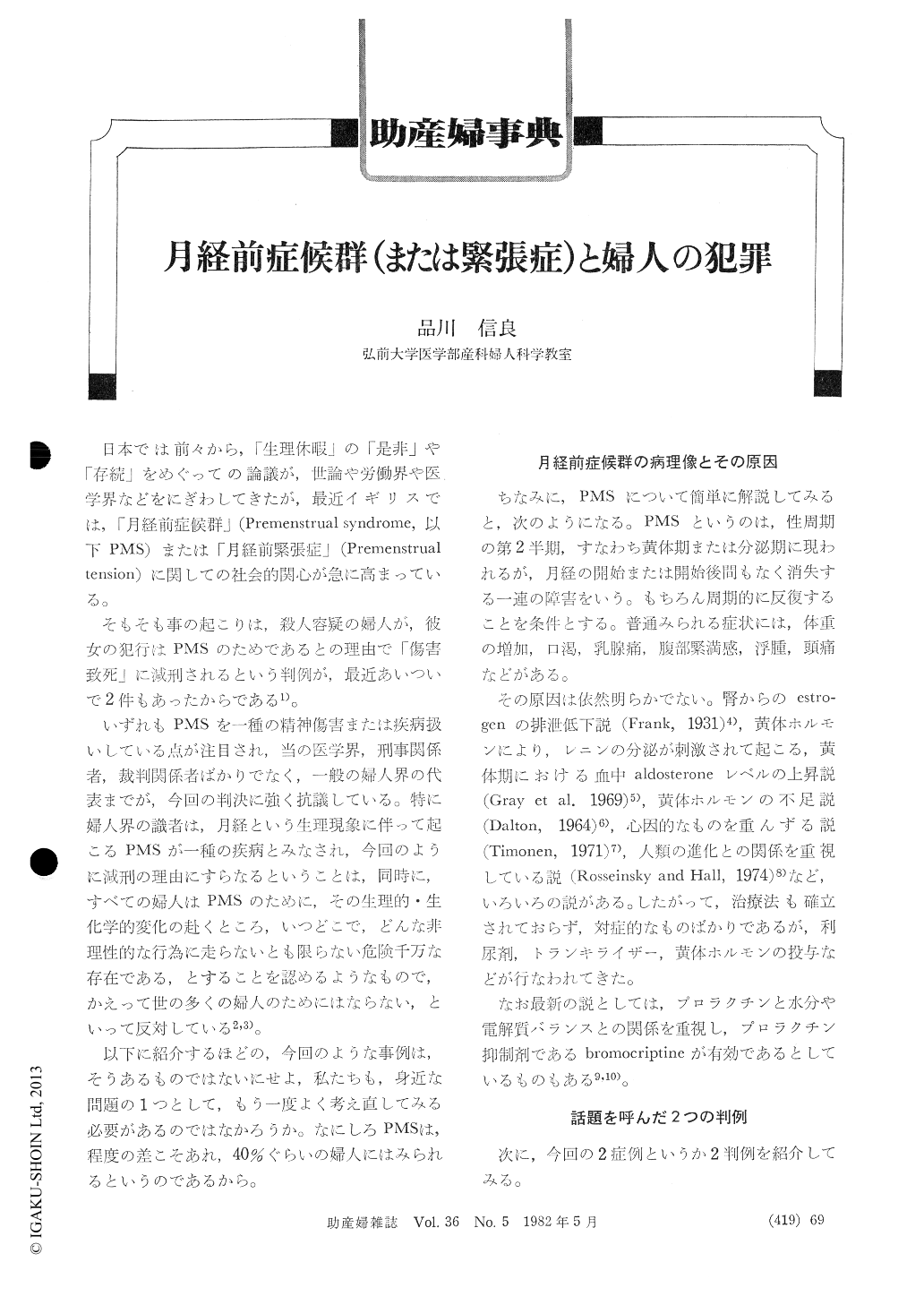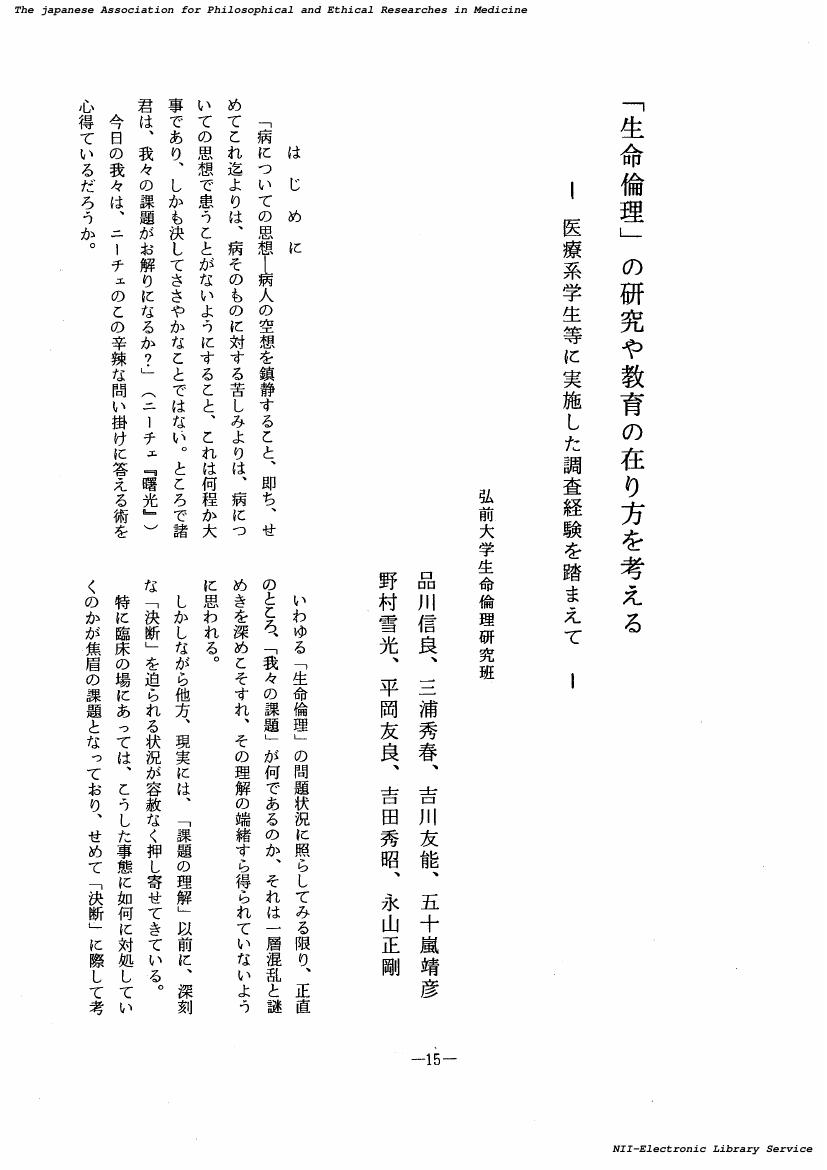2 0 0 0 いわゆる「男女の産み分け」における主な問題点
- 著者
- 品川 信良
- 出版者
- 有斐閣
- 雑誌
- ジュリスト (ISSN:04480791)
- 巻号頁・発行日
- no.870, pp.p50-53, 1986-10-15
- 被引用文献数
- 1
2 0 0 0 月経前症候群(または緊張症)と婦人の犯罪
- 著者
- 品川 信良
- 出版者
- 医学書院
- 雑誌
- 助産婦雑誌 (ISSN:00471836)
- 巻号頁・発行日
- vol.36, no.5, pp.419-421, 1982-05-25
日本では前々から,「生理休暇」の「是非」や「存続」をめぐっての論議が,世論や労働界や医学界などをにぎわしてきたが,最近イギリスでは,「月経前症候群」(Premellstrual syndrome,以下PMS)または「月経前緊張症」(Premenstrualtension)に関しての社会的関心が急に高まっている。 そもそも事の起こりは,殺人容疑の婦人が,彼女の犯行はPMSのためであるとの理由で「傷害致死」に減刑されるという判例が,最近あいついで2件もあったからである1)。
1 0 0 0 OA 医の倫理や哲学への一老医の回想
- 著者
- 品川 信良
- 出版者
- 日本医学哲学・倫理学会
- 雑誌
- 医学哲学 医学倫理 (ISSN:02896427)
- 巻号頁・発行日
- vol.29, pp.1-3, 2011-09-30 (Released:2018-02-01)
1 0 0 0 OA 医・生命倫理、五十年余の回顧と今後への希望
- 著者
- 品川 信良
- 出版者
- 日本医学哲学・倫理学会
- 雑誌
- 医学哲学 医学倫理 (ISSN:02896427)
- 巻号頁・発行日
- vol.18, pp.134-143, 2000-12-15 (Released:2018-02-01)
This is the Second Part of a speech which was delivered in the 18th Annual Meeting of Japanese Association for Philosophical and Ethical Researches in Medicine held in October, 1999, and the author discussed here bioeethical issues alone. In the First Part of this speech the author discussed the medico-ethical issues which are omitted in this paper but have already been published (in Reference 1). Main topics dealt with in this paper are: 1. American bioethics as one of the postwar American dreams 2. Critical appraisal on American bioethics: American bioethics at the Cross-roads 3. Bioethics and environmental ethics 4. Eastern and Western bioethics: Asian and Euro-American bioethics 5. Fundamental principles of bioethics 6. Standardization and globalization in bioethics 7. "Genoethics" and "phenoethics" (Reference 15) Topics discussed in the First Part of this speech and already published in Reference 1 were: 1. General education in premedical course of senior high schools before and during World War II 2. The Foundation of Ministry of Health and Welfare in 1938 under the strong leadership of Japanese Army for the preparation and promotion of war : the principal functions of MHW were an increase in population, prohibition of induced abortion and contraception, control of pulmonary tuberculosis, veneral diseases and trachoma conjunctivitis 3. Ethical Code of Japan Medical Association and of Physicians during WWE 4. Influence of American Occupation Troops on medical education and practice in post-war Japan 5. Main trends in medical science and practice in post-war Japan 6. War responsibilities and war crimes judged at Tokyo War Crimes Trials 7. From period of National Eugenic Law (1941) which prohibited induced abortion and contraception to the years of Eugenic Protective Law (1948) which semi-liberated induced abortion and contraception
1 0 0 0 OA 日本の医療におけるリベラリズムの位置 : 患者や医師などの意思が否定される場合
- 著者
- 品川 信良
- 出版者
- 日本医学哲学・倫理学会
- 雑誌
- 医学哲学 医学倫理 (ISSN:02896427)
- 巻号頁・発行日
- vol.16, pp.90-100, 1998-10-01 (Released:2018-02-01)
After a short description on liberalism in health care from the viewpoint of both patients and physicians, based on more than 45 years of clinical practice, the situation of liberalism in health care of today's Japan was introduced. Although Japan has achieved the longest average lifeexpectancy in the 1990s, liberalism in health care of Japan is now in a situation of decline, and maintenance of the humanitarian patientphysician relationship and/or clientprovider relationship has been threatened greatly because financial, social and bureaucratic powers are now so strong in the health care of Japan. The situation of the health care system in Japan may be called socio-nationalistic with a concrete basis of capitalism of American model; in other words "competitive socio-communism"!
1 0 0 0 OA 医の倫理教育 : その過去、現在及び未来
- 著者
- 品川 信良
- 出版者
- 日本医学哲学・倫理学会
- 雑誌
- 医学哲学 医学倫理 (ISSN:02896427)
- 巻号頁・発行日
- vol.15, pp.107-118, 1997-09-20 (Released:2018-02-01)
From an experience of more than twenty years in undergaduate and postgraduate education of medical ethics and bioethics, the author discussed the following four problems. 1. Eduation of bioethics should be started as early as possible by parents and kindergarten teachers, and should be followed by primary and secondary school teachers prior to medical education. 2. During the past twenty years, almost every Japanese including medical students became very familiar with medicoethical and bioethical issues arising from new medical technology. However, education on citizens' everyday ethics and pupil / students' ethics are more important than medical ethics relating to modern topics such as euthanasia, in vitro fertilization, organ / tissue transplantation and so on. 3. When, by whom, where, in which stage of the curriculum, in which style, on what kind of topics, medical ethics education should be done, are all very difficult questions to answer, However, the author have reached the following answers. (1) The effect of lecture style education on medical ethics in a large lecture hall, especially in the preclinical course is very limited. (2) Small group discussion on everyday clinical practice is more important than a systematic lecture. (3) Everyday ethical and humanitarian behaviors of all practitioners to the patients and their families are more important than lectures by famous professors. 4. Why Japanese physicians show less concern about medicoethical and bioethical issues was discussed. Some of the reasons are : (1) It results largely from a cultural difference between Euro-American countries and Japan. (2) Japan is too legalistic country in which most behavior of the people is regulated by laws, most of them enacted in the 19th century, rather than by medical ethics and bioethics. (3) Medical practice in Japan is typical Managed Care controlled by government and National Health Insurance Laws. For most physicians it is rather rare to find an opportunity of ethical decision-making. (4) The Physician-Health Insurance Law relationship and patient-government relationship are very often more important as well as more powerful than the patient-physician relationship in Japan. (5) Medical education in Japan both in pre- and postgraduate courses is a typical School Medicine or University Medicine which places too much attention on medical science and modern high-technology, respecting less the humanity, human dignity and interests of the community.
1 0 0 0 OA 最近の中国の生命倫理事情
- 著者
- 品川 信良
- 出版者
- 日本医学哲学・倫理学会
- 雑誌
- 医学哲学 医学倫理 (ISSN:02896427)
- 巻号頁・発行日
- vol.14, pp.180-181, 1996-10-01 (Released:2018-02-01)
- 著者
- 品川 信良
- 出版者
- 日本医学哲学・倫理学会
- 雑誌
- 医学哲学 医学倫理 (ISSN:02896427)
- 巻号頁・発行日
- vol.12, pp.99-105, 1994-10-01 (Released:2018-02-01)
Since the 19th century, the more that medicine has advanced, the more the distance between medicine and other specialties such as philosophy, ethics, and law has increased. When science and technology are subspecialized, the number of subspecialists with narrow views is very likely to increase. Medicine is not an exception. To narrow this distance between medicine and philosophy, ethics and law, many attempts and trials are in progress almost throughout the world, especially in advanced countries. Probably the most interesting among them is in the United States of America (USA). In the USA, with regard to clinical ethics and medicolegal problems, the development of a new srecialty or of a new job, independent both from patients and physicians, is in progress, and the number of new specialists has been increasing since the 1980s. One new specialty of this kind is called "ethics consultation", and its specialists are called "ethics consultants" or "clinical ethicists". An attempt toward in progress has been made in Hirosaki, Aomori Prefecture in Northern Japan, since 1991. An association named "Seminar Medicine and Community" was founded. The numbers was 300 in October, 1993. Of them, 174(58.0%) and 89(29.7%) consisted of physicians and comedical staff, respectively. The remaining 37(12.3%) are specialists in philosophy, ethics, law and so on. Meeting are held once every three months, for discussions on selected controversial topics and traditional basic problems relating to health care and medicine from interdisciplinary viewpoints. In addition we publish a journal (Journal of Health Care, Medicine and Community) every six months. Papers are published in Japanese with English abstracts. Papers either from inside or outside Japan by any author who does not belong to our association will be accepted if judged by the editorial board to be "distinguished"
1 0 0 0 OA 医学倫理学が直面している選択 : 人道主義をとるか功利主義をとるか
- 著者
- 杜 治政 品川 信良
- 出版者
- 日本医学哲学・倫理学会
- 雑誌
- 医学哲学 医学倫理 (ISSN:02896427)
- 巻号頁・発行日
- vol.11, pp.133-146, 1993-10-01 (Released:2018-02-01)
1 0 0 0 OA 歴代医務従事者の医療道徳観に対する儒家、道家、墨家の影響
- 著者
- 欒 栄生 王 暁艶 品川 信良
- 出版者
- 日本医学哲学・倫理学会
- 雑誌
- 医学哲学 医学倫理 (ISSN:02896427)
- 巻号頁・発行日
- vol.11, pp.147-148, 1993-10-01 (Released:2018-02-01)
- 著者
- 品川 信良
- 出版者
- 日本医学哲学・倫理学会
- 雑誌
- 医学哲学 医学倫理 (ISSN:02896427)
- 巻号頁・発行日
- vol.11, pp.114-117, 1993-10-01 (Released:2018-02-01)
Three main ethical issues were introduced and discussed. They were: 1. "Unethicalities" latent in medical practice and nursing-Things not generally permitted in society are from time to time permitted in the world of medical practice and nursing. Things which are vilified or proscribed as unethical acts in the rest of society are permitted in the name of " care and cure", and if one were to list them they would appear as follows. (1) Secrets of others cannot help but be learned. Facts which the patient and his/her family would like to keep secret must be clearly written down, preserved in records, and reported upon. (2) The bodies of others are touched and observed. (3) Necessity compels injuries to the skin, veins, and organs of others. (4) The cells/tissues and body fluids of others must be collected and examined. (5) Substances and energies which humans normally do neither ingest nor are exposed to must be imparted to the bodies of others for the purpose of diagnosis and treatment (6) Foreign objects such as suture materials and medico-chemicals are left within the human body. (7) Experimental acts must be performed not only on animals but also occasionally on humans. 2. Minimum ethical requirements in nursing and care 3. Ethical dilemmas in nursing and care with special reference to the future of the nurse-client relationship, nurse-nurse relationship and nurse-physician relationship.
- 著者
- 品川 信良
- 出版者
- 日本医学哲学・倫理学会
- 雑誌
- 医学哲学 医学倫理 (ISSN:02896427)
- 巻号頁・発行日
- vol.9, pp.145-147, 1991-07-31 (Released:2018-02-01)
1 0 0 0 OA 医療倫理教育の在り方
- 著者
- 品川 信良
- 出版者
- 日本医学哲学・倫理学会
- 雑誌
- 医学哲学 医学倫理 (ISSN:02896427)
- 巻号頁・発行日
- vol.7, pp.70-73, 1989-07-31 (Released:2018-02-01)
1 0 0 0 OA 「生命倫理」の研究や教育の在り方を考える : 医療系学生等に実施した調査経験を踏まえて
1 0 0 0 OA 日本の産婦人科医が現在かかえている医療倫理上の諸問題
- 著者
- 品川 信良
- 出版者
- 日本医学哲学・倫理学会
- 雑誌
- 医学哲学 医学倫理 (ISSN:02896427)
- 巻号頁・発行日
- vol.5, pp.48-60, 1987-07-10 (Released:2018-02-01)








